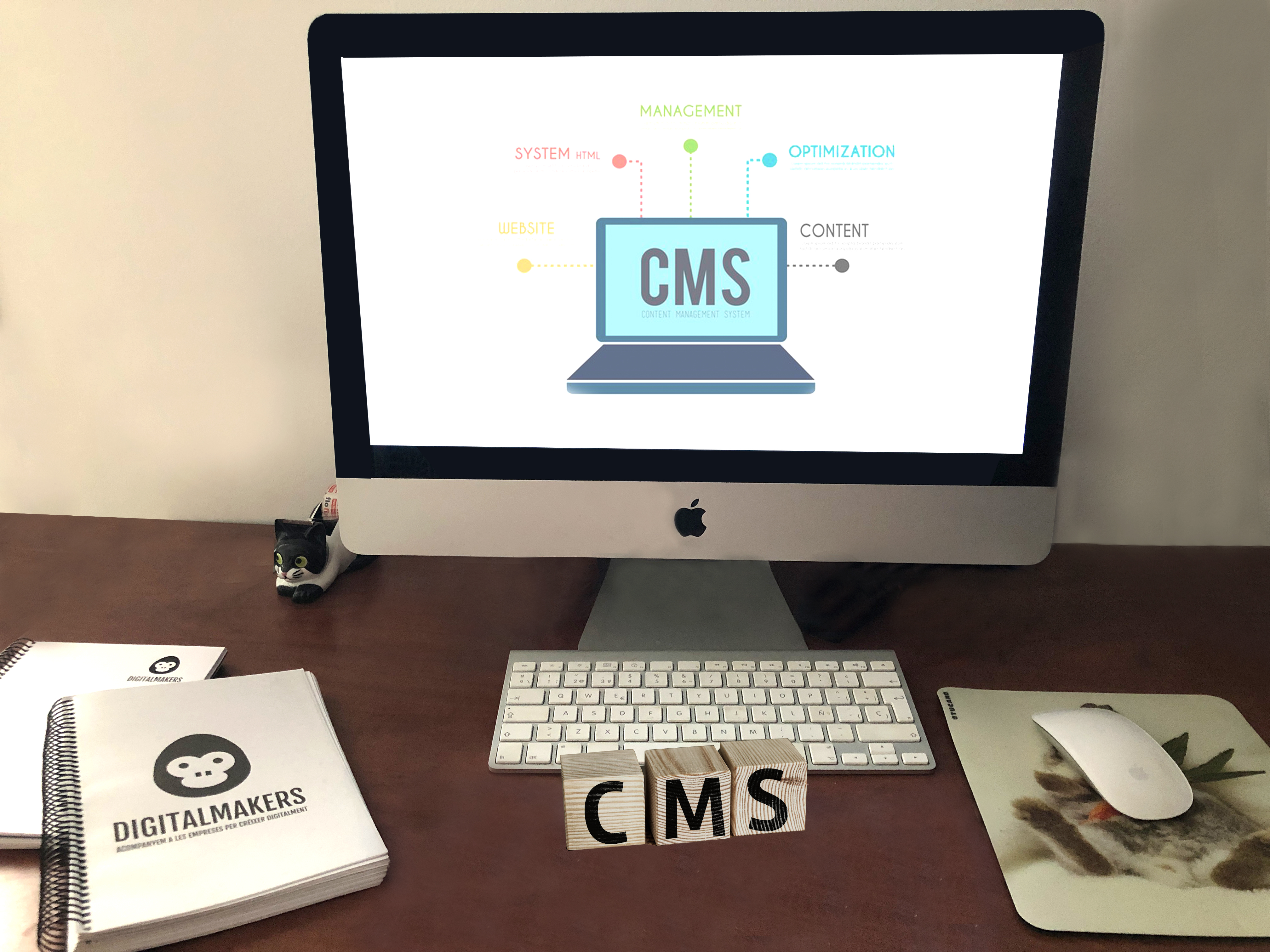Probably one of the most important decisions you must make when starting a new website project (or migrating an existing one) is choosing which type of CMS to use for its development. It is essential to have a solid foundation that meets your current and future needs, as any creation or migration process involves work (and money). Asking the right questions, knowing the market, and making the right choice will allow you to build a strong base on which to develop an effective digital strategy.
At DigitalMakers, we want to support you in this crucial stage, which is why we have prepared a series of articles to help you make informed decisions. To begin with, in this article we explain what a CMS is and what the main types available on the market are.
What does CMS stand for?
CMS stands for "Content Management System".
Basically, it is software that allows you to manage the publications of a website or blog without needing programming knowledge. With a CMS, you can easily modify, publish, or delete content on your site.
CMSs can be classified in many ways, for example, according to the needs they cover: blogs (WordPress), wikis (Wikimedia), education (Moodle), forums (phpBB), corporate websites (Drupal, Joomla, HubSpot...), ecommerce (Shopify, Prestashop, WooCommerce)...
In this article, we will divide them according to software ownership, as this aspect directly affects security (when handling sensitive databases) and cost. Of course, what they allow you to do technically is also important, but the three categories below cover most project needs.
Open Source CMS
Open Source means "open code": the source code is released freely for use and modification.
This may seem like the most attractive option if cost is a key factor. However, behind this “free” there are associated costs and certain security risks if not managed properly.
Popular examples: WordPress, Drupal, Joomla, Prestashop, or WooCommerce.
Pros
 The CMS itself is free; no license fees are required.
The CMS itself is free; no license fees are required. A large community develops plugins, templates, and page builders. Some add-ons are paid.
A large community develops plugins, templates, and page builders. Some add-ons are paid. Its popularity makes it easy to find tutorials and support forums.
Its popularity makes it easy to find tutorials and support forums.
Cons
 You need to hire hosting, install the CMS, and handle maintenance, updates, and backups. Here we explain why web maintenance is crucial.
You need to hire hosting, install the CMS, and handle maintenance, updates, and backups. Here we explain why web maintenance is crucial. Plugins can introduce vulnerabilities if not managed properly.
Plugins can introduce vulnerabilities if not managed properly. For advanced functionalities, you’ll need specialized technical support.
For advanced functionalities, you’ll need specialized technical support.
Proprietary CMS
A proprietary CMS is developed by a company and marketed under a license.
Examples: Adobe Experience Manager, Kentico, Sitecore.
Pros
 Higher security, stability, and professional technical support.
Higher security, stability, and professional technical support. Designed to meet specific needs of certain industries.
Designed to meet specific needs of certain industries. The provider handles updates and maintenance.
The provider handles updates and maintenance.
Cons
 High cost in licenses and development.
High cost in licenses and development. Limited independent community and fewer specialized providers.
Limited independent community and fewer specialized providers.
SaaS CMS (Software as a Service)
SaaS stands for "Software as a Service": the software and data are hosted in the cloud and accessed from any device with an Internet connection.
This is a variant of proprietary CMS, but with a more flexible and accessible approach. Examples: Squarespace, Wix, Shopify, or HubSpot CMS. Although some associate SaaS with basic systems, there are highly professional and scalable SaaS solutions available.
Pros
 No servers or maintenance required; the provider takes care of backend, backups, and updates.
No servers or maintenance required; the provider takes care of backend, backups, and updates. They offer a simple user experience with professional results.
They offer a simple user experience with professional results. More affordable than proprietary CMS and, considering support and time, can be more cost-effective than some open-source options.
More affordable than proprietary CMS and, considering support and time, can be more cost-effective than some open-source options. Some (like HubSpot) allow integration with CRM and other key business tools.
Some (like HubSpot) allow integration with CRM and other key business tools. Quick to launch, without lengthy configuration processes.
Quick to launch, without lengthy configuration processes. Many come with APIs and advanced support, enabling highly complex projects.
Many come with APIs and advanced support, enabling highly complex projects.
Cons
 Advanced features may require premium plans.
Advanced features may require premium plans. Since you do not control the software, you depend on the provider (low risk with well-known platforms).
Since you do not control the software, you depend on the provider (low risk with well-known platforms). Requires a constant Internet connection.
Requires a constant Internet connection.
Ultimately, the choice of CMS will depend on the type of project, budget, and available technical resources. For businesses seeking simplicity, scalability, and efficiency without technical headaches, SaaS-type CMS —like HubSpot— represent an increasingly solid and strategic option to boost their digital presence.
If you have any questions or want us to delve deeper into a specific CMS, don’t hesitate to contact us. We’ll be happy to help.












